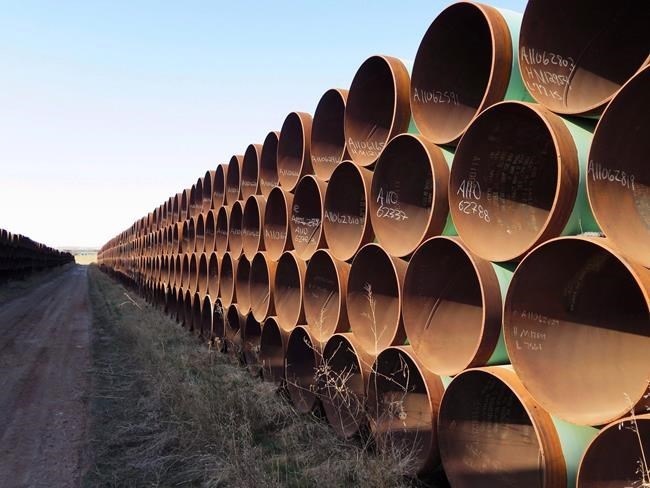CALGARY — The CEO of TC Energy Corp. is warning that the cost of its Coastal GasLink pipeline to bring natural gas from northeastern B.C. to Canada's first LNG export terminal is rising and completion will likely be delayed due to a construction halt to control spread of the COVID-19 pandemic.
On a conference call to discuss fourth-quarter results on Thursday, Francois Poirier said the company is in discussions with provincial health authorities to safely resume work after an order was issued in December restricting worker numbers at industrial projects in the Northern Health Authority region.
"We expect that project costs will increase and the schedule will be delayed due to scope increase, permit delays and the impacts of COVID-19, including the provincial health order," he said.
The project was estimated to cost $6.6 billion when announced in 2018. TC Energy said it is working with the consortium that owns the $40-billion LNG Canada project to establish a revised pipeline plan.
TC Energy again warned Thursday it expects to take a "substantive" charge on its cancelled Keystone XL pipeline project when it reports first-quarter results, without being specific.
It said it expects the charge to be mostly non-cash, but that it was assessing its options along with its partners, the government of Alberta and the Natural Law Energy Indigenous group, and other stakeholders.
On the call, Poirier said the company doesn't see much in the way of opportunities to build other large oil pipeline infrastructure but it will achieve its target of $5 billion to $6 billion per year in capital spending in other ways.
Those could include maintenance, growth projects at the Bruce Power nuclear facility in Ontario, expansions of existing natural gas and liquids pipelines in Canada and the U.S. and renewable power projects to reduce greenhouse gas emissions at existing sites, he said.
"Our starting point is that this is irreplaceable infrastructure," he said in response to a question about filling the gap left by the Keystone XL project.
"It's a very high-quality cash flow stream underpinned by contracts with creditworthy counterparties and any other alternative has to compete with the growth and earnings and cash flow that this is going to generate."
U.S. President Joe Biden cancelled the presidential permit for Keystone XL on his first day in office last month, leading to the company stopping construction.
In the spring of 2020, TC Energy approved spending US$8 billion to complete Keystone XL after the Alberta government agreed to invest about US$1.1 billion (C$1.5 billion) as equity and guarantee a US$4.2-billion project loan.
In its just-posted 2020 annual report, TC Energy says the carrying value of the Keystone XL project is about $2.8 billion, which reflects the amount remaining after a 2015 impairment charge, along with additional amounts expended since January 2018.
It said in the report that Alberta had invested about US$800 million in equity in the project as of Dec. 31.
Cash costs associated with Keystone XL could be offset by recoveries from shippers who contracted space on the pipeline, pointed out analyst Ian Gillies of Stifel FirstEnergy in a report on Thursday.
In recent earnings results, shipper Cenovus Energy Inc. reported a non-cash provision of $100 million and Suncor Energy Inc. took a $142 million charge related to backstopping Keystone XL.
The 1,947-kilometre pipeline was designed to carry 830,000 barrels a day of crude oil from Hardisty, Alta., to Steele City, Neb., where it would connect with the company's existing facilities to reach the U.S. Gulf Coast refining centre.
On Thursday, TC Energy raised its quarterly dividend to 87 cents per share from 81 cents and reported its fourth-quarter profit rose compared with a year ago.
TC Energy said it had net earnings attributable to common shareholders of $1.12 billion on $3.3 billion in revenue for the quarter ended Dec. 31, compared with a profit of $1.11 billion on $3.26 billion in revenue a year earlier.
This report by The Canadian Press was first published Feb. 18, 2021.
Companies in this story: (TSX:TRP)
Dan Healing, The Canadian Press



